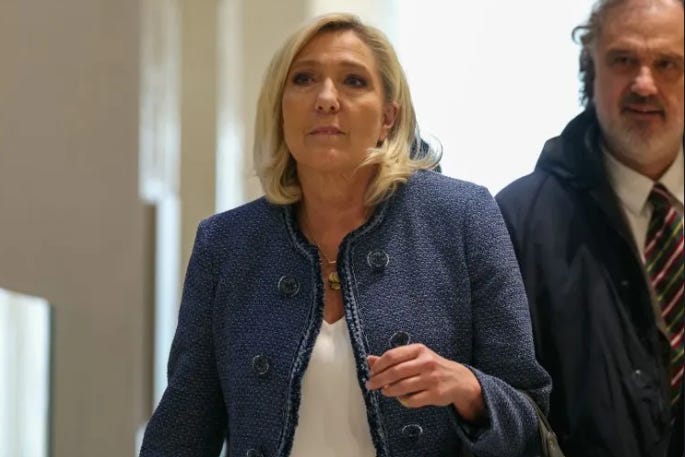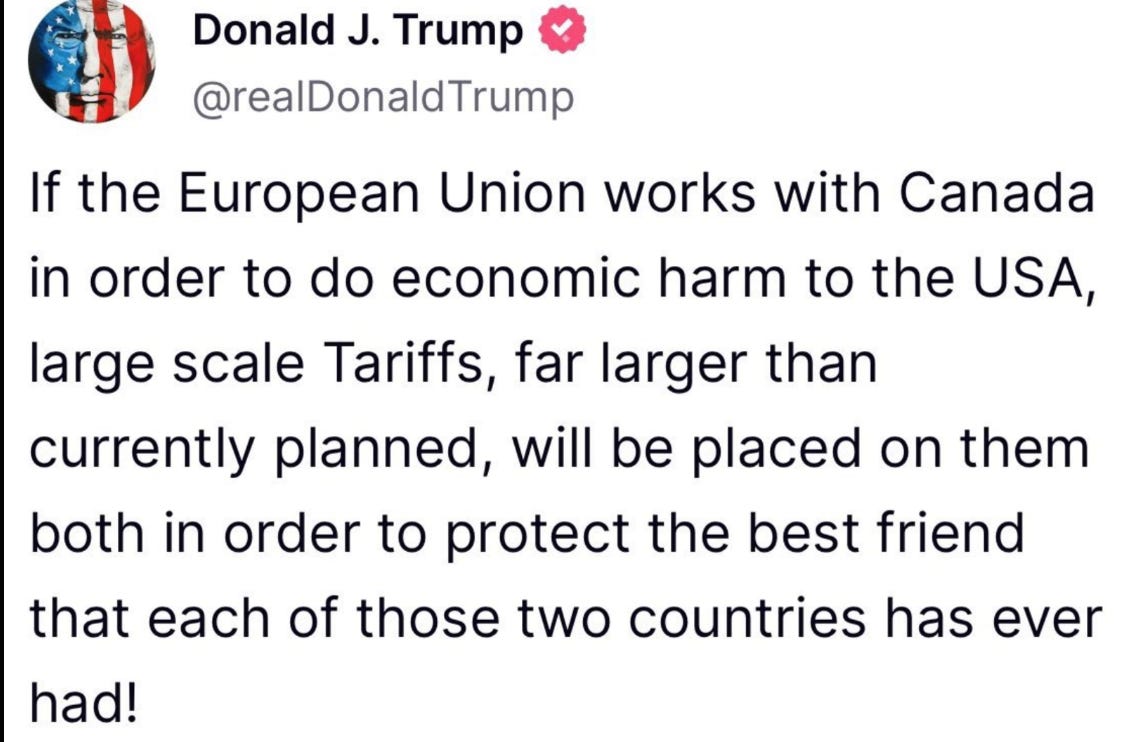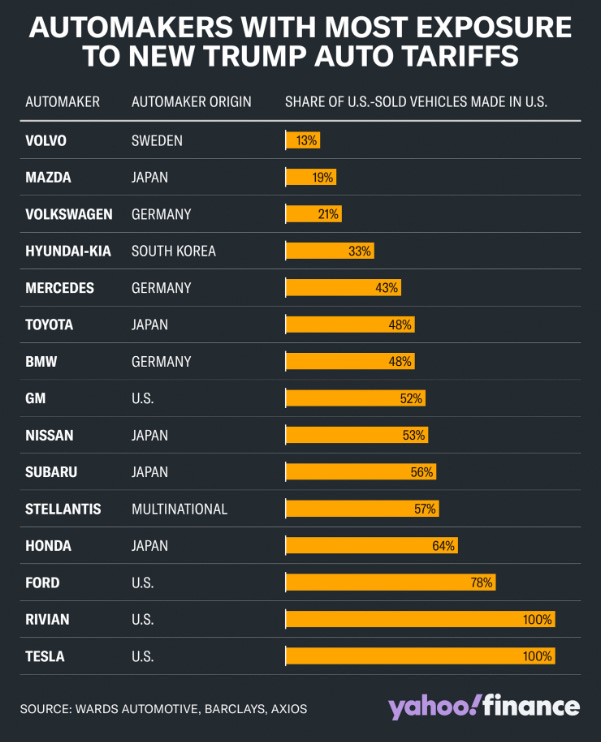UK to Introduce New Crypto Regulations, US Unlocks Strategic Defense Aid to the Philippines, Marine Le Pen Barred From Public Office, Trump Plans Broad-Based Permanent Tariffs, and More
Grinfi Political Risk Intelligence Weekly Briefing
Welcome to this week’s edition of Grinfi Political Risk Edge, your trusted source for expert political risk analysis and strategic intelligence. In this issue, we examine key geopolitical events shaping the defense, energy, and DeFi markets, providing a deep, beyond-the-headlines assessment. Anticipate, Adapt, and Excel!
But first, let’s begin the week with a laugh 😄 to brighten the mood.
"It is our true policy to steer clear of permanent alliances with any portion of the foreign world"
George Washington, "Farewell Address." Delivered on September 19, 1796, and first published in Claypoole’s American Daily Advertiser (Philadelphia) on the same date. Accessible at: https://avalon.law.yale.edu/18th_century/washing.asp.
Disclaimer: The opinion expressed in this quote does not represent our views but is intended for reflection purposes only.
From Grinfi Political Risk Observatory (GPRO), here’s what we’re monitoring:
High Impact Situational Updates
MAJOR HEADLINES
- Trump Warns Canada and EU of ‘Far Larger’ Tariffs
President Trump has threatened significantly higher tariffs on Canada and the European Union if they coordinate opposition to the United States' new trade measures. His March 26 executive order imposed a 20 percent tariff on $1.2 trillion in imports, with a permanent 25 percent levy on automobiles set to take effect on April 3, one day after the widely promoted April 2 proclamation, which Trump has called "Liberation Day."
After the announcement, Asian markets saw sharp declines, with Toyota down 2% and Honda dropping 2.5%. In Europe, Volkswagen and BMW fell 1.7% and 1.8%, respectively. On March 28, the Dow dropped more than 700 points, while S&P stocks tanked. Below are the automakers most exposed to the new U.S. auto tariffs:
In response, Canada is preparing $107 billion in retaliatory measures targeting U.S. oil and agricultural exports, while the EU has finalized $28 billion in countertariffs. Meanwhile, India and Brazil have taken more cautious approaches. India lowered tariffs on U.S. whiskey from 150% to 100% ahead of Trump’s tariff deadline, while Brazil has emphasized negotiations over retaliation.
- West African Juntas Impose 5% Import Levy as Guinean Leader Doumbouya Pardons Dadis Camara
Military governments in Mali, Niger, and Burkina Faso have imposed a 5% tax on all imports, affecting $10 billion in annual trade. While the move aims to boost state revenues, it risks reducing trade flows by $1 billion and worsening food insecurity for 20 million residents. Additionally, Niger has withdrawn from the Lake Chad military force, following the three countries' formal withdrawal from ECOWAS on January 29, 2025. French President Macron has warned that the countries may face ‘economic isolation’, though it’s likely they will pivot toward Russia and China.
In other news, on March 28, Guinean President General Mamadou Doumbouya pardoned former dictator Moussa Dadis Camara, who had been serving a 20-year sentence for crimes against humanity related to the 2009 massacre that left scores of people dead and over 100 women raped. The pardon, granted for “health reasons” according to a decree read on state television, came without medical evidence. Camara was moved from prison to a villa in Conakry under police surveillance.
The decision has sparked significant backlash. Human Rights Watch has criticized it as a signal of impunity, while others argue it undermines the junta’s claims of delivering justice. Just days earlier, Doumbouya had announced reparations ranging from $23,000 to $173,000 for victims, but the pardon now casts doubt on his commitment to accountability. This move also raises the risk of reopening the ICC probe, further damaging the junta’s credibility. At the moment, all opposition protests have been banned.
- Hamas Agrees to Tentative Ceasefire Brokered By Egypt and Qatar
On March 29, Hamas finalized a ceasefire proposal brokered by Egypt and Qatar, allowing for the resumption of food and other essential supplies. Meanwhile, since March 26, reports have emerged of anti-Hamas protests in Gaza, with thousands of Palestinians calling for an end to both Hamas rule and the ongoing war.
- Trump Signals Potential Strikes on Iran Over Uranium Stockpile
U.S. President Donald Trump has warned of possible military action against 10 Iranian facilities in response to Tehran’s accumulation of 50 kilograms of near-weapons-grade uranium. The administration is also considering further sanctions on Iranian oil, further tightening economic pressure. At the same time, the Iranian rial has depreciated to over 1,000,000 per U.S. dollar, its lowest level on record, due to Trump’s renewed sanctions campaign. If this trend continues, Iran’s severe economic downturn could trigger internal instability. So far, however, Trump’s neo-Nixonian foreign policy strategy has failed to break the alliance between Russia and China or weaken their ties to proxies like Iran and North Korea.
- Is Trump Serious About a Third Term?
It appears that Trump has so far managed to distract the American and global publics from the political embarrassment of the Signal leak by floating the idea of running for a third term during an NBC News interview on Sunday, March 30, in clear contravention of the 22nd Amendment (Amendment XXII), which states:
"No person shall be elected to the office of the President more than twice, and no person who has held the office of President, or acted as President, for more than two years of a term to which some other person was elected President shall be elected to the office of the President more than once,"
Evidently, his preferred tactic of deny, deflect, and distract has once again proven effective in a political environment where sensationalism thrives.
However, last week, the fallout from the Signal chat leak was quite dramatic. Representative Mike Waltz defended himself by claiming he had never met Goldberg and that Goldberg’s number had been "sucked into his phone." Meanwhile, the House Intelligence Committee held fiery hearings with the directors of the FBI, CIA, and DNI, with particularly sharp exchanges from Democratic lawmakers.
DNI Gabbard, who previously challenged Goldberg in her Senate testimony to release the full text and argued that no plans were discussed, later stated that she had not remembered key details at the time but now recalls them, attributing the discrepancy to lapses in recollection.
When asked whether Defense Secretary Hegseth’s alleged drinking problems might have affected his judgment, CIA Director Ratcliffe, who admitted to being part of the chat, reacted with a heated outburst.
The Trump administration has insisted that the chat discussed "attack plans" rather than "war plans" and that no classified information was shared, though the messages contain details that could be considered top secret under the DNI classification scheme.
Notwithstanding, following the Trump administration’s challenge for Goldberg to release the full text, he has now published what he calls the "attack plans" discussed in the chat, though some details may have been redacted due to their sensitivity to US intelligence and national security.
Here’s the full Signal message chain:
- French RN Leader Marine Le Pen Convicted in Embezzlement Case and Barred from Public Office
On March 31, a Paris court convicted Marine Le Pen, leader of the National Rally (RN) party, for embezzling €4.1 million in European Parliament funds between 2004 and 2016. She was sentenced to four years in prison, with two years suspended and two to be served under house arrest with an electronic tag. Additionally, she was fined €100,000 and immediately banned from holding public office for five years, effectively disqualifying her from the 2027 presidential race unless an appeal overturns the decision.
The case focused on allegations that Le Pen and 24 co-defendants diverted EU funds intended for parliamentary aides to support RN party operations in France. While there was no evidence of personal enrichment, the court ruled the scheme violated EU regulations and undermined democratic principles. Judge Bénédicte de Perthuis described the actions as a “democratic bypass,” holding Le Pen personally accountable for €474,000 of the misused funds.
Le Pen reacted defiantly, labeling the verdict as politically motivated and vowed to appeal. She framed herself as a fighter who could not be easily eliminated. Shortly after the ruling, she posted on X, reaffirming her commitment to fighting back.
RN president Jordan Bardella denounced the ruling as an “execution of French democracy” and called the decision a ‘democratic scandal’. He also launched a petition in solidarity with Le Pen.
Internationally, so-called far-right leaders such as Orbán, Salvini, and Geert Wilders, along with some figures in Trump's orbit, condemned the verdict, labelling it as judicial overreach. In contrast, left-wing and centrist politicians hailed the decision, stressing the importance of accountability. Jean-Luc Mélenchon, however, appeared divided, acknowledging that the RN’s position had some merit but arguing that no elected official should be removed in such a manner. He went further, calling for a Sixth Republic, a stance that led to strong rebukes from his coalition, with some urging him to keep quiet and refrain from commenting on a matter that did not concern him.
The ruling could have a significant impact on French politics and political stability. Le Pen, who twice reached the presidential runoff against Macron and was a frontrunner for 2027, now faces an uncertain future. While her legal troubles may rally RN’s base, they also create an opening for Bardella to take control of the party, a shift that could test RN’s unity and electoral strength. The appeal process, which could be lengthy, will determine whether Le Pen can make a comeback or if this marks the end of her decades-long rise. There is also a risk of unrest and protests, particularly from Le Pen’s supporters, who view the ruling as politically motivated and see her









